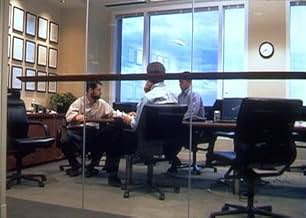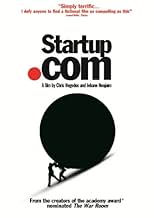IMDb RATING
7.1/10
3.5K
YOUR RATING
Traces the birth and failure of new media company govWorks.com.Traces the birth and failure of new media company govWorks.com.Traces the birth and failure of new media company govWorks.com.
- Awards
- 10 wins & 6 nominations total
Jonathan Agus
- Self
- (as Jonathan Agus)
Featured reviews
I myself worked in one of the ubiquitous .com's in the late 90's and this movie is frightening realistic, from the long hours and technical glitches right down to the embarrassingly lame cheers.
I read on the web the filmmakers set out to document their friends impending wealth and business fortune with this documentary, but what they got was the complete opposite. I think that speaks volumes for expectations during this era.
I feel like some of the other IMDb reviews are off the mark. Yes, the movie is sometimes hard to follow. But it was shot in the Cinéma-vérité genre and that is to be expected. It is an uncompromising real life look, and it is up to the viewer to decipher; sometimes this works sometimes not. Some previous reviews wondered how the company folded. Honestly its a movie about an internet company, why do you think it failed? Having said this, I think more could have been shown of why Tom got the axe and the love relationships of Kaliel could have been better developed.
According to the DVD the producers cut some realistic (and boringly technical) scenes to focus more on the relationship between Tom and Kaleil. This is where they succeeded. They are trying to tell the story of the company downfall through the interplay of these two characters. It is fascinating because it is real. The most compelling part is the coorelation between their relationship eroding as does the company. Viewed from that point of view this movie is really not a documentary. Nevertheless it is entertaining and gripping. What amazed me was the unfettered greed and their enormous hubris which prevented them from acknowledge their role in this sinking ship.
I read on the web the filmmakers set out to document their friends impending wealth and business fortune with this documentary, but what they got was the complete opposite. I think that speaks volumes for expectations during this era.
I feel like some of the other IMDb reviews are off the mark. Yes, the movie is sometimes hard to follow. But it was shot in the Cinéma-vérité genre and that is to be expected. It is an uncompromising real life look, and it is up to the viewer to decipher; sometimes this works sometimes not. Some previous reviews wondered how the company folded. Honestly its a movie about an internet company, why do you think it failed? Having said this, I think more could have been shown of why Tom got the axe and the love relationships of Kaliel could have been better developed.
According to the DVD the producers cut some realistic (and boringly technical) scenes to focus more on the relationship between Tom and Kaleil. This is where they succeeded. They are trying to tell the story of the company downfall through the interplay of these two characters. It is fascinating because it is real. The most compelling part is the coorelation between their relationship eroding as does the company. Viewed from that point of view this movie is really not a documentary. Nevertheless it is entertaining and gripping. What amazed me was the unfettered greed and their enormous hubris which prevented them from acknowledge their role in this sinking ship.
I have friends who either work for or own a Dotcom company. So many fail, but they keep going at it. For those who make it, life can be sweet. It use to be a world where everyone can make it until the NASDAC fell apart.
This film by former MTVers, is a slick and glossy look at a rise and fall of a Dotcom company. We follow two high school buddies (Kaleil and Tom) from their coming up with a name and idea for their site to their breakup and demise. The emotions are all there, from elation to despair. You are there for everything. Though the film has no narration you can still tell what is going on if you pay attention.
This is an interesting piece of life in the late 20th century. You'll think about these guys the next time you go cruising through the internet. If you see it, rent it.
This film by former MTVers, is a slick and glossy look at a rise and fall of a Dotcom company. We follow two high school buddies (Kaleil and Tom) from their coming up with a name and idea for their site to their breakup and demise. The emotions are all there, from elation to despair. You are there for everything. Though the film has no narration you can still tell what is going on if you pay attention.
This is an interesting piece of life in the late 20th century. You'll think about these guys the next time you go cruising through the internet. If you see it, rent it.
Startup.com is not a movie about the dot-com boom. It's not a movie about building a business; it's not a movie about technology and new industries.
It's a movie about greed and ego.
The two founders start off with the idea that they want to create a "dot com" -- they bounce around a bunch of goofy ideas like virtual cemetaries and eventually settle on a portal for government-related services. The fact that they wanted to document the startup of this venture from day one is another testimonial to their ego, greed and lack of focus.
I agree with most of the comments others have said about the movie. It's fragmented, and has gaping holes in it relating to explaining what's going on. The viewer ends up really not having a clue as to why the venture failed, which is another testimonial to the principals in that apparently the nature of what went wrong wasn't nearly as important to them as the fact that it did go wrong and their dreams weren't realized. Boo hoo.
After seeing the movie and not having much additional information on the project, I am left with my own thoughts as to some of the blanks that the film left open. Specifically, these guys failed because they were more interested in the fruits of their labor, than the labor itself, which was a means to an end. That's why they failed. The only reason they got as far as they did is they ran into others, greedy employees, greedy financiers who were just like them and had no passion for the job, just the brass ring that was promised at the end.
They might have had "good people" working for them, but I'd bet that there wasn't a single person in the company who actually had innate passion for the application and industry they were in. If you ask any successful businessman what's the secret, the first thing they'll likely tell you is, "Do something you enjoy doing." I'm sure Kalil enjoyed hob-nobbing with rich people, but that wasn't the purpose of his company, though it looks like his subsequent career involves that.
We're left to try to figure out exactly how things went wrong.
The one thing that I'm left with is, the tech end of the project never worked right. I'd bet good money the whole foundation was built on Windows technology and was never very flexible or manageable. And Tom is probably responsible for dropping the ball there, but then again like I said, these guys didn't really care about the business... they just wanted to be successful.
If anything, the movie doesn't really teach us lessons about startups. It is a tale of two misguided, self-absorbed guys who find other self-absorbed people with more money and get a free ride for a little while.
It's a movie about greed and ego.
The two founders start off with the idea that they want to create a "dot com" -- they bounce around a bunch of goofy ideas like virtual cemetaries and eventually settle on a portal for government-related services. The fact that they wanted to document the startup of this venture from day one is another testimonial to their ego, greed and lack of focus.
I agree with most of the comments others have said about the movie. It's fragmented, and has gaping holes in it relating to explaining what's going on. The viewer ends up really not having a clue as to why the venture failed, which is another testimonial to the principals in that apparently the nature of what went wrong wasn't nearly as important to them as the fact that it did go wrong and their dreams weren't realized. Boo hoo.
After seeing the movie and not having much additional information on the project, I am left with my own thoughts as to some of the blanks that the film left open. Specifically, these guys failed because they were more interested in the fruits of their labor, than the labor itself, which was a means to an end. That's why they failed. The only reason they got as far as they did is they ran into others, greedy employees, greedy financiers who were just like them and had no passion for the job, just the brass ring that was promised at the end.
They might have had "good people" working for them, but I'd bet that there wasn't a single person in the company who actually had innate passion for the application and industry they were in. If you ask any successful businessman what's the secret, the first thing they'll likely tell you is, "Do something you enjoy doing." I'm sure Kalil enjoyed hob-nobbing with rich people, but that wasn't the purpose of his company, though it looks like his subsequent career involves that.
We're left to try to figure out exactly how things went wrong.
The one thing that I'm left with is, the tech end of the project never worked right. I'd bet good money the whole foundation was built on Windows technology and was never very flexible or manageable. And Tom is probably responsible for dropping the ball there, but then again like I said, these guys didn't really care about the business... they just wanted to be successful.
If anything, the movie doesn't really teach us lessons about startups. It is a tale of two misguided, self-absorbed guys who find other self-absorbed people with more money and get a free ride for a little while.
"Start-up.com" is a really involving documentary, a dot-com story brought to life with real lives and real people.
It was particularly astonishing how interesting it is as I'd just finished watching the 10 episode fictional mini-series on BBCAmerica that covers the same ground, "Attachments" and the non-fiction version mostly holds up as entertainment as well.
Where it doesn't is intrinsic in the D.A. Pennebaker-produced techniques -- how much of what we see can stand alone as fact and how much is interpretively selected by the filmmakers? And how much of what we see is influenced by whom was the most comfortable with the filmmakers' constant presence, or who was the most verbal when the cameras are around?
Clearly, the central figure CEO gave the filmmakers (one of whom was an old college friend) the most access, so we get a lot on him, and even some glimpses at his personal life. Was govworks.com Achilles heel insufficient attention to the actual web site functioning or were geeks less interesting to the filmmakers than the deal making CEO's?
The fictional version was very careful to contrast the types. A compromise technique is the one "Real World" takes where we see (somewhat phony, somewhat staged) action unfold and then have the participants face the camera to explain themselves.
But the context here is missing for the geeks working on the project (which "Attachments" is sensitive to) as opposed to the brash, camera-charming entrepreneurs.
(originally written 7/8/2001)
It was particularly astonishing how interesting it is as I'd just finished watching the 10 episode fictional mini-series on BBCAmerica that covers the same ground, "Attachments" and the non-fiction version mostly holds up as entertainment as well.
Where it doesn't is intrinsic in the D.A. Pennebaker-produced techniques -- how much of what we see can stand alone as fact and how much is interpretively selected by the filmmakers? And how much of what we see is influenced by whom was the most comfortable with the filmmakers' constant presence, or who was the most verbal when the cameras are around?
Clearly, the central figure CEO gave the filmmakers (one of whom was an old college friend) the most access, so we get a lot on him, and even some glimpses at his personal life. Was govworks.com Achilles heel insufficient attention to the actual web site functioning or were geeks less interesting to the filmmakers than the deal making CEO's?
The fictional version was very careful to contrast the types. A compromise technique is the one "Real World" takes where we see (somewhat phony, somewhat staged) action unfold and then have the participants face the camera to explain themselves.
But the context here is missing for the geeks working on the project (which "Attachments" is sensitive to) as opposed to the brash, camera-charming entrepreneurs.
(originally written 7/8/2001)
I think the greatest thing about this film is how it really shows the audience the future while the people in the film have no idea what is coming around the corner.
We get a real sense of what is to come early on when Tuzman comes back from a meeting trying to raise capital. He bitches about how he got ripped to shreds by one investor (you have no project experience etc... etc..). It's a very telling sign.
and it is amazing to watch how Tuzman was duplicated over and over again by several people who just threw money at a phenomenon without understanding it. It was an amazing thing to witness and Startup.Com captures it like nothing I have ever seen before.
Add in some dramatic moments, an office break in, a missing lawyer, a ruthless competitor, and a telling firing.. and startup.com is one documentary that will engage you.
Rating 8 out of 10
We get a real sense of what is to come early on when Tuzman comes back from a meeting trying to raise capital. He bitches about how he got ripped to shreds by one investor (you have no project experience etc... etc..). It's a very telling sign.
and it is amazing to watch how Tuzman was duplicated over and over again by several people who just threw money at a phenomenon without understanding it. It was an amazing thing to witness and Startup.Com captures it like nothing I have ever seen before.
Add in some dramatic moments, an office break in, a missing lawyer, a ruthless competitor, and a telling firing.. and startup.com is one documentary that will engage you.
Rating 8 out of 10
Did you know
- Trivia"The Competitor" who is donning the govWorks.com cap, Bryan R. Mundy of ezGov.com, died in a house fire six days before the movie premiered at Sundance.
- How long is Startup.com?Powered by Alexa
Details
- Release date
- Country of origin
- Official site
- Language
- Also known as
- Стартап.ком
- Filming locations
- Silicon Valley, California, USA(business meeting)
- Production companies
- See more company credits at IMDbPro
Box office
- Gross US & Canada
- $1,283,356
- Opening weekend US & Canada
- $16,118
- May 13, 2001
- Gross worldwide
- $1,830,008
- Runtime
- 1h 47m(107 min)
- Color
- Sound mix
- Aspect ratio
- 1.33 : 1
Contribute to this page
Suggest an edit or add missing content























